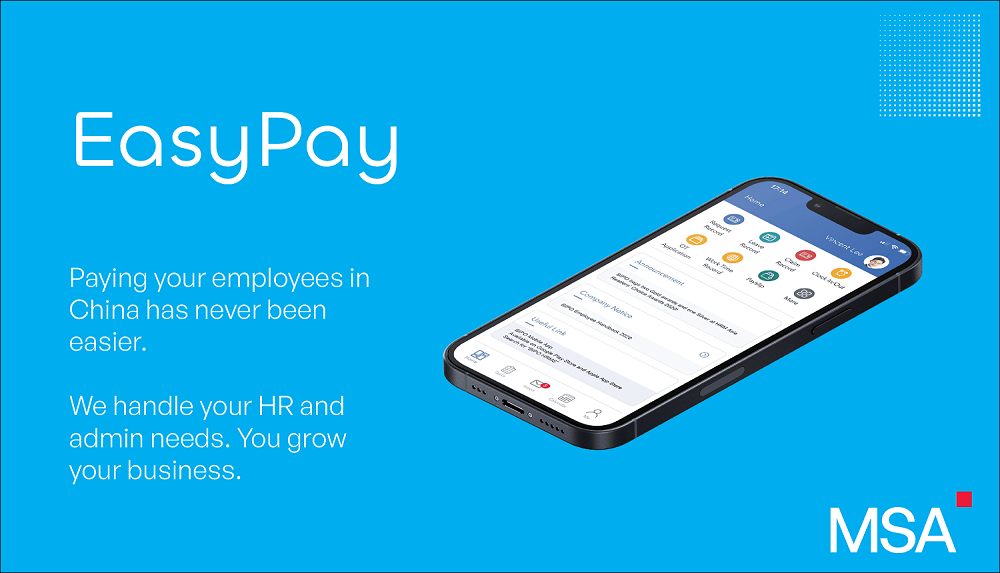Finding a way to hire and pay employees for a business venture in China can be a cumbersome task. Even though it may seem like a complicated task, there are several methods to employ local and foreign talents for your business in China. Here are 6 ways companies can enter the Chinese market and hire staff for their business needs.
Wholly Foreign-Owned Enterprise (WFOE)
A Wholly Foreign-Owned Enterprise (WFOE) is a type of Limited Liability Company (LLC) in China. It invites foreigners to establish a legal entity in China to boost consulting, manufacturing and trading activities in the country. This is the preferred entry mode for foreign investors who want to gain access to the Chinese market.
One of the benefits of a WFOE is that foreign investors can maintain complete control over their business. The investors do not have to partner with local entities, so they have full power and responsibility over corporate decisions. Additionally, WFOEs can employ both local and foreign employees.
WFOEs can directly sign a labor contract with local and foreign employees and are responsible for ensuring the payroll and mandatory benefits are processed on time. WFOEs often outsource the entire payroll process to an HR firm to ensure compliance and faster processing.
Advantages
- The company can directly hire and manage employees.
- Can employ both foreign and local professionals.
- Offers better legal protection to both parties in employment relationships.
- There is no limit on the maximum number of employees that can be hired.
Disadvantages
- Can be costly to incorporate.
- It can be a lengthy process depending on the needs of the business.
- Recurring costs of complying with taxes and regulations.

Register a WFOE (Wholly Foreign-Owned Enterprise) in China
Our consultants are experts in company registration throughout China. Having assisted SMEs and multinationals...
Read moreJoint Venture
A Joint Venture (JV) is a type of LLC established through a partnership between 1 or more foreign investor(s) and 1 or more legal Chinese entities or companies.
Investors often use this type of setup to invest in a restricted industry, where JVs are allowed to use the existing presence and networks of the Chinese partner in the local market to expand their operations.
When it comes to hiring employees, a JV has similar capacities to a WFOE, i.e., they are able to hire both foreign and local employees. The key difference is that all parties involved in the partnership should agree with the decision on hiring employees and have a say on the employees hired.
Advantages
- Allows foreign investors to perform business activities in restricted industries.
- Access the expertise of the Chinese partner in dealing with local regulations.
- Can employ both foreign and local professionals.
- There is no limit on the maximum number of employees that can be hired.
Disadvantages
- Less control over business decisions.
- Any relevant information must be shared with partners, even if it is considered sensitive.

Joint Venture in China
A Joint Venture is a Limited Liability Company (LLC) which is established through a...
Read moreRepresentative Office
A Representative Office (RO) has a much more limited scope than a WFOE but is an option for foreign investors that want to enter the Chinese market. Although it is the simplest and fastest option for foreigners to set up operations in China, there are numerous disadvantages for those businesses wanting to carry out commercial activities.
An RO is an option for investors who:
- Have restricted budget and resources;
- Are in the early market exploration phase;
- Require more time to study the Chinese market;
- Need only a simple local presence in the country to conduct activities such as liaising or quality assurance of services and products.
This type of business cannot independently and directly hire Chinese staff. It needs to go through a Chinese agency that will handle the employment and payroll of hired employees. Foreign staff can be employed as representatives (only up to four), with taxes and contributions calculated according to the days of their stay in China.
Advantages
- It is the cheapest and easiest option for foreign investors that want to have a presence in China.
- No capital is needed to start the business.
- Faster setup and registration process compared to a WFOE and JV.
Disadvantages
- It is restricted in its scope and can only be used for marketing and research purposes.
- Cannot carry out any commercial activities for profit.
- Unable to hire local Chinese employees.
- Restricted to hiring up to 4 foreign employees.
- Must use a labor dispatch agency to hire local employees in the country.
Dispatching Service
Dispatching is the practice of hiring people through an employment service agency established in China. Foreign businesses that do not have a registered legal entity in China often choose this method to hire employees in the country. This is also used by local entities whenever they need a fast and convenient way of meeting their demand for employees.
Workers are required to sign employment contracts with the dispatching agency. However, the employee supervision and day-to-day activity is handled by the client or business that requires the employee. Under this type of employment relationship, clients are protected from numerous liabilities since the employees do not directly work under the client and are instead registered under the dispatching service provider.
Businesses using dispatching services can legally deduct Individual Income Tax (IIT) and make social security contributions (both employee and employer contributions).
Advantages
- This form of employment is beneficial to businesses doing seasonal activities or is focused on project-based work.
- Companies can easily scale up or down their workforce as needed.
- If a dispute arises, businesses are protected from liabilities because the employees are not directly hired by the company.
Disadvantages
- Since the company does not directly employ the dispatched workers, the business may have trouble controlling the security of sensitive information.
- Not an optimal option for enterprises who have a long-term outlook.
Service Contract
A service contract can be a way for companies to employ Chinese individuals with the benefit of reduced labor disputes. Take note that only a registered company in China can use service contracts to hire part-time workers. However, foreign investors can use a China PEO to legally outsource services to Chinese workers.
There are different types of service contracts in China that an entity can use: fixed-term, open-ended, and job contracts. Each one has a different duration and regulations that have to be followed.
Advantages
- Bigger cost savings because contractors are not full-time employees of the company, so they are not required to make certain contributions.
- Greater flexibility in hiring and firing employees, depending on the workload needed by the company.
- Fewer problems with labor disputes because contractors do not enjoy the same benefits that full-time employees do.
Disadvantages
- Companies have less control over the quality of work and performance of the contractors.
- Availability can be a problem because the schedule of the contractor may not be in line with the company’s window for deliverables.
Branch Office
A Branch Office is an organization established outside its residence to engage the market in other major locations in China. It is essentially an extension of the main office, so liabilities are assumed by the parent company.
Establishing a Branch Office may be more practical than creating a subsidiary to expand the legal presence of the company to other parts of China.
There are two types of branch offices: operational and non-operational.
A non-operational Branch Office can neither directly engage in business transactions nor independently hire employees. On the other hand, an operational Branch Office can directly employ local Chinese staff in the desired location, issue fapiaos, and is required to pay social contributions.
Advantages
- Fully compliant solution for expanding the business to other locations in the country.
- More practical to establish and maintain than a WFOE (however you first need to have a WFOE established in the country).
- An easy solution for hiring local and foreign employees in other areas of China.
Disadvantages
- The parent company assumes all the liabilities of the Branch Office.
- A non-operational Branch Office needs a third-party agency to hire local staff.
Conclusion
Each of the methods discussed here for hiring employees in China has different advantages and disadvantages, all with its own responsibilities. Some give you direct control over employee management, while others have restrictions on the ability to hire employees and the scope of activities they can carry. It is best to evaluate your business needs, future plans and access to resources, before you select a way to hire and pay employees in China
If you are looking for a more efficient way of hiring Chinese workers, get in touch with us right away and let us help you find an ideal solution. Our consultants make sure your business stays compliant with the ever-changing regulatory landscape in China.





